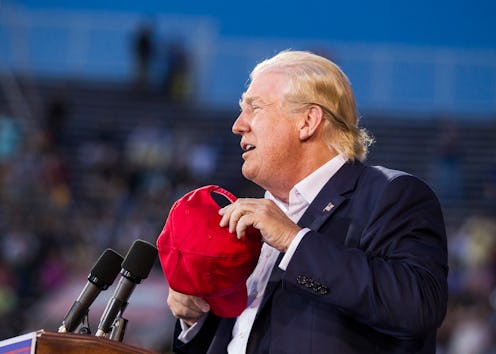News
Here's How Not To Respond To Orlando
On Sunday, a gunman opened fire at the Pulse nightclub in Orlando, Florida, killing 50 people and injuring dozens more. The death toll made it the deadliest mass shooting in American history, and in addition to the shooter having reportedly pledged allegiance to ISIS during the attack, it's also been widely viewed as an anti-gay hate crime ― Pulse was a popular gay club. And just like you might expect, you'll probably be hearing your fair share of wrong responses to the Pulse shooting.
It's bound to happen when any event this major and frightening take places, especially with as many politically relevant through-lines as what happened in Orlando. Bringing together counter-productive and often-inflammatory notions about religion, sexual orientation, gun policy, and immigration, and in the thick of a presidential election? It all makes for a political powder-keg, and it's like catnip for some of the more reductive arguments out there.
Here are four such examples of misguided or misplaced claims about the Orlando shooting, whether about what caused it or what needs to happen next.
1. "The Shooter Was A Member Of ISIS"
Thusfar, there's no evidence that the man authorities say executed the Orlando attack was actually a member of the Islamic militant group ISIS. What is true, according to reports, is that he apparently called a 911 emergency line before or during the attack and pledged his allegiance to ISIS leader Abu Bakr al-Baghdadi.
There's a very crucial difference between these two realities. In the first, the shooter could be an agent of a terrorist organization who lived among unsuspecting Americans before committing an atrocious act of anti-gay violence. In the second, which is as far as available evidence illustrates, he could be a man whose homophobia or violent tendencies led him to commit an atrocity first, and staple it to ISIS second.
And that's an important distinction, because it helps inform a potential response. It also can't be overlooked that the ISIS has explicitly urged lone-wolf attackers within the United States, knowing that it can't execute such attacks as effectively on its own. In other words, pending further evidence, there's a good chance ISIS knew nothing about this attack ahead of time, and is now trying to ride the notoriety from it.
2. "No New Gun Law Could've Stopped This"
Not true! Whether you're talking about more conventional reforms, like putting up barriers to gun ownership for people who are or have been on a terrorism watch-list, something in the middle like reinstating the Federal Assault Weapons Ban for certain guns, or something more radical, like trying to repeal the 2nd Amendment, there are possible solutions from a gun control perspective that could've made a difference in this case.
Obviously, even if you believe the 2nd Amendment should be wholly repealed, that's is a pipe dream in the current political climate, considering how steep a hill you'd have to climb to get a constitutional amendment passed, and also the near-impossible task of confiscating hundreds of millions of guns out of private ownership, from people who definitely aren't going to want to give them up.
But the former suggestion is pretty relevant right now, given that senate Republicans voted down an amendment in December designed to keep people on the terrorism watch-list from buying guns ― the Pulse shooter himself was reportedly on such a watch-list a few years ago. People can have fair disagreements about whether that idea goes too far, not far enough, or is just right, but if someone really thinks there's no change in policy that could've have made a difference here, they're lacking in imagination.
3. "America Needs Trump's Muslim Ban"
With one major political party's nominee loudly calling for a ban on Muslims entering the United States ― Donald Trump, naturally ― every successive incident that can be tied to an extremist group like ISIS, whether they had any operational oversight or not, can be used to advance that fundamentally xenophobic idea. But xenophobia and anti-Muslim stigmatization are in many regards exactly what ISIS very explicitly wants, for the chilling and antagonistic effect it has on relationships between Muslim and non-Muslim communities throughout the world.
And honestly, maintaining a religious test for entry to the country? As President Obama alluded to in his noticeably irate speech on Tuesday, there's about as compelling a case to call that un-American as any policy idea you'll find ― freedom of religion (and freedom from religion, for all the non-believers out there) are fundamental tenets of the American experiment, and that must not be steamrolled, even under trying circumstances.
4. "Islam Is The Problem"
With the United States having been locked in a years-long conflict with ISIS, a self-claimed "Islamic state" that's expressing one of the most violent, dogmatic and brutal interpretations of the faith possible, it's no surprise that some politicians and political observers alike have been loudly proclaiming that Islam itself is uniquely violent, or uniquely homophobic.
But it's not as though any one religion has a monopoly on extreme, homophobic or draconian elements, even if one might be most publicized or highly visible at this moment in time ― take, for example, this Sacramento, California, Baptist pastor who openly endorsed the killings, and said he wished the shooter had "finished the job." And beyond cheerleading for it, plenty of non-Muslim religious and secular institutions alike have actively engaged in this sort of violent speech.
The truth is, homophobia is a scourge that's run through many religions throughout history, and it is humanity's inclination to form dominant in-groups and marginalized out-groups that's the common denominator.
